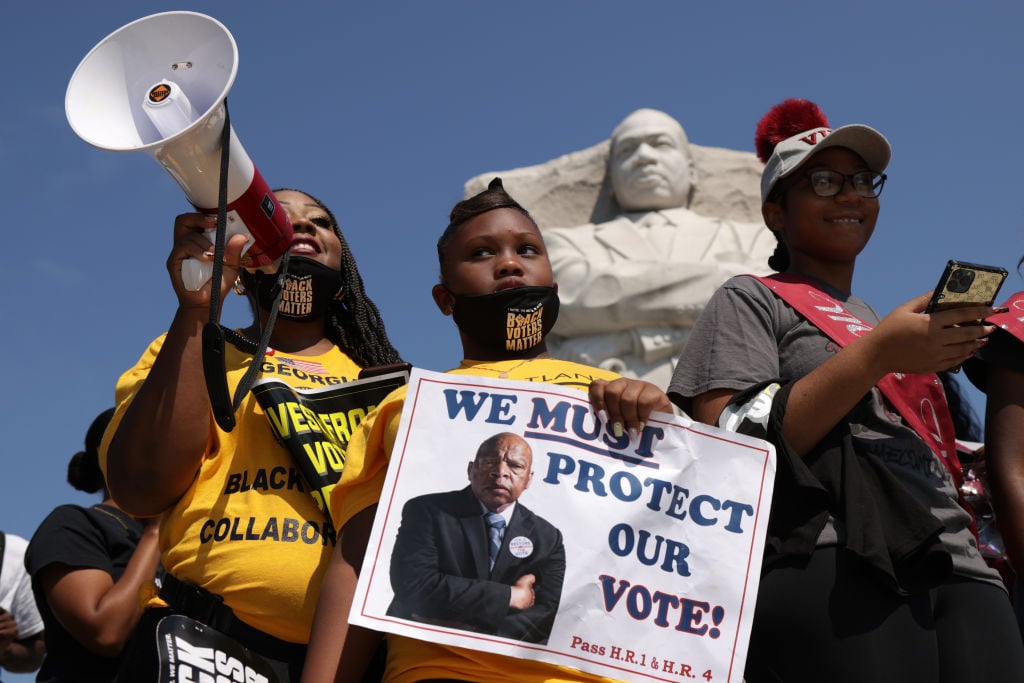
Supreme Court Appears Poised To Gut Voting Rights Act: Here’s What To Know – Blavity
The Supreme Court’s conservative justices have indicated that they are set to strike down a portion of the Voting Rights Act of 1965. The conservatives have expressed hostility to the portion of the act that promotes the creation of majority-minority districts. Striking down that portion of the Voting Rights Act could allow states, particularly Republican-led states in the South and elsewhere, to eliminate majority-Black districts, significantly decreasing Black and Democratic representation in Congress.
Supreme Court conservatives seek ‘end point’ for Voting Rights Act protections
The conservative justices of the Supreme Court have indicated that they believe that the 1965 Voting Rights Act should no longer be used to enforce the creation of majority-minority congressional districts. While hearing arguments concerning the application of the Voting Rights Act to create a second majority-Black district in Louisiana, the court’s conservative majority indicated that they believe that the protections of the 1965 law are no longer necessary. Justice Brett Kavanaugh suggested that anti-discrimination remedies such as majority-minority districts should only be used “for a limited period of time” and “should have an end point.” Justice Neil Gorsuch equated the drawing of majority-Black districts as “intentional” discrimination, despite the fact that this process is meant to fight against anti-Black discrimination.
These skeptical comments come as the Supreme Court is currently hearing a case challenging the creation of a second majority-Black congressional district in Louisiana based on Section 2 of the Voting Rights Act. Section 2 bans racial discrimination in voting, and it has been interpreted, among other things, to ensure that the number of congressional districts in states roughly coincides with the proportion of minority voters in those states. The act was recently used to strike down a Republican-drawn district map in Louisiana that made only one of the state’s six districts majority Black, despite Black people making up roughly one-third of Louisiana’s population. A group describing itself as “non-African American” voters sued, claiming that the decision to require a second Black district in Louisiana discriminated against white voters in the state.
Seeming to eliminating Black districts, shifting the balance of power in Congress
If the conservative justices strike down or significantly weaken Section 2, such a ruling could effectively neutralize the power of the Voting Rights Act to protect against racial discrimination in voting policies. The Supreme Court has already weakened the Voting Rights Act through a 2013 ruling that decided that states with a history of racial discrimination no longer had to receive prior approval for changes to their voting laws. Since then, Republican-controlled states have enacted a host of restrictive voting laws that critics argue have disproportionately disenfranchised or obstructed Black voters. The immediate impact of a ruling against Section 2 is that several Republican-led states, mainly in the South, could eliminate majority-Black and majority-Democratic districts in their states.
Experts predict that at least six to eight majority-Black districts would be eliminated if the Voting Rights Act protections are lifted, including both Black districts in Louisiana, with the possibility of even more racial and partisan gerrymandering across the country. This change would both have a significant impact on Black representation and potentially shift partisan control of Congress by giving Republicans an advantage in winning the House of Representatives. Allowing for the elimination of Black districts would also exacerbate a trend by which Republican leaders in states such as Texas have aggressively redrawn district lines to benefit the GOP. Although Democratic governments like that in California have retaliated with their own redistricting, Republican control of state governments gives the GOP an advantage in gerrymandering, allowing them to create more Republican-friendly districts.
The Supreme Court is expected to hand down its decision on the Louisiana case next summer, making it uncertain whether it will impact redistricting prior to the 2026 midterm elections. But if the court does strike down a major provision of the Voting Rights Act, the impact on Black voters and the nation will be substantial, wiping out much of the progress that has been made in ensuring Black representation in Congress.
The post Supreme Court Appears Poised To Gut Voting Rights Act: Here’s What To Know appeared first on Blavity.
Source link
#Supreme #Court #Appears #Poised #Gut #Voting #Rights #Act #Heres #Blavity
powered by Auto Youtube Summarize
Categories News
Tags Act Appears Blavity Court Gut Heres Poised Rights Supreme Voting
